The Writing Process: Five Essential Stages for Anything You’re Working On
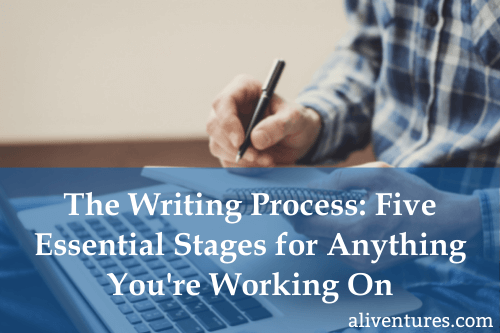
Note: This post was first published with four stages of writing in 2011, and updated in May 2021 to include the publishing stage. Images are used under the Creative Commons 2.0 license.
Do you struggle to focus when you’re writing, or do you find yourself starting and stopping a lot? It might be because you’re skipping certain stages of the writing process without even realising.
Every finished writing project, big or small, passes through five key stages. These are sometimes described as the writing process:
- Prewriting: ideas, research, and planning
- Drafting: what most people think of as “writing”
- Rewriting: making big-picture changes
- Editing: making detailed changes
- Publishing: putting your work out there into the world
Sure, you could potentially publish a blog post without doing any planning, or any rewriting and editing. Unless you’re very lucky, though (or writing something extremely short), you’ll be lacking a clear focus, the structure won’t quite work, and there’ll be clumsy sentences all over the place.
It wouldn’t really be a finished piece. It would be a draft.
The five stages don’t always have to be tackled in precise order. Sometimes, you’ll find that they can be combined: a short piece might only need a single pass-through for both rewriting and editing. With long pieces, you’ll often loop back from one stage to a previous one at times, too.
These stages don’t have to be carried out by the same person, either. When freelancing, I’ve written blog posts based on other people’s plans, and I’ve often had my work edited (and published) by others.
But it’s crucial to be clear about what each stage involves. If you’re struggling with a particular piece of writing, there’s a good chance that you’ve skipped a step somewhere – or that you’ve tried to do everything at once.
Stage #1: Prewriting
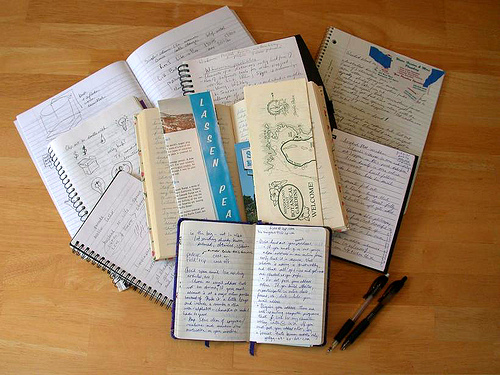 Image by Dvortygirl
Image by Dvortygirl
Prewriting involves coming up with an idea and developing it. Often, you’ll do some research at this stage, though if you’re writing on a familiar topic, you may not need to. You might write a rough outline or even a very detailed one.
You’re likely already spending some time on prewriting, even if you haven’t recognised it as that. If you have a brilliant idea for a blog post while you’re in the shower, and mull it over as you drive to work, that’s prewriting.
Some written pieces don’t need any more prewriting than that: you’ve got the idea in your head, pretty much complete. Anything lengthy, though, will benefit hugely from a written plan.
There are plenty of different ways to plan. For instance, you can use mindmaps to generate and sift ideas, and construct a more linear outline as you start to shape your material.
When the process of writing is more of an exploration – I’m thinking primarily of fiction here – then you don’t necessarily have to to plan in detail. You’ll want to get some basics clear, though: your concept or theme, your main characters, and the ending.
Ideally, you’ll have thought about the crucial high points and low points of your plot, too. For more on that, check out this post about the seven key plot points you should know about.
Better Planning
- Keep a notebook. Use this as a place to record and explore ideas. Even if something doesn’t fit this project, it might become part of the next one.
- Plan ahead, either at the start of the whole project (e.g. a blog post) or at the start of each scene or chapter in a novel.
Stage #2: Drafting
 Image by laffy4k
Image by laffy4k
When we talk about “writing”, we often mean “drafting”. We imagine sitting down at the keyboard, opening up a blank document, and typing away, filling the screen with exactly what we want to say, expressed clearly and cleverly.
And maybe, once in a while, that actually happens. But my first drafts rarely look anything like that! And I’d guess yours don’t either.
It’s almost impossible to get a piece of writing just right during the first draft. Rather than aiming for perfection, aim for completion. Your goal when you write is to keep putting one word after another, fairly quickly, building up sentences, paragraphs, pages…
Not all those words will be quite right. At this stage of the writing process, you’ll have a mixture of problems, from the structure of the whole piece right down to the individual words that you choose.
- Some sections from your plan don’t seem to fit any more
- A particular chapter (or character, subplot, concept) just isn’t working
- You haven’t explained ideas clearly enough
- Your sentences are flabby (over-wordy) or clumsy (ambiguous, repetitive, clunky-sounding)
- You might have notes to yourself in the text, to look up particular facts, or fill in a gap
None of this is bad. This is just the nature of first drafts. You’re shaping your material and forming your ideas as you go along – and of course it won’t always come out perfectly.
Better Drafting
- Keep going. It’s easy to look at your draft material and despair: you’ve written five pages of fluff, or you’ve realised that your main character is insufferable, or your blog post seems to be going nowhere. Don’t give up. You get to fix it all in the next stage.
- Write regularly. This stage takes a lot of energy: it’s an intense process of creation. If you only write when you feel inspired, you won’t get far. Aim to write at least weekly – ideally more. For help with this, check out the Supercharge Your Writing guides.
Stage #3: Rewriting
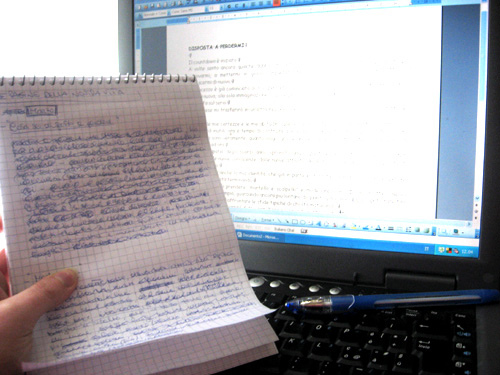 Image by the Italian voice
Image by the Italian voice
This is the part of the writing process that newer writers often skip – but it’s just as important a part of writing as the first draft stage.
Rewriting is when you take what you’ve written and rework it. (You may also hear this stage called called redrafting, developmental editing, or big picture editing.) That doesn’t mean checking for typos, or tidying up a few sentences. It usually involves big-picture, structural change like:
- Cutting whole chapters or sections
- Adding in chunks of new material (and returning to the drafting stage for these)
- Moving things around – perhaps chapter 5 should really be chapter 1
- Sorting out any of those “notes to self” from the first draft – adding in facts or cross-references, for instance
It’s not unusual for novelists to cut out whole characters and subplots at this stage. Sometimes, what seemed like a great idea during planning and drafting just doesn’t quite work out.
To rewrite, you need to get some distance on your work. That might mean putting it aside for a few weeks (something that I’ve always done when drafting my novels), or it might mean getting feedback from other people.
Some writers find that they actually enjoy the rewriting stage more than drafting. It’s a different form of creativity – you’re able to work with what’s already there, shaping and honing it.
Better Rewriting
- Read the whole piece through. Make a note of any repetitive scenes/sections, and anything which you think needs cutting or adding. Imagine that you’re a reader coming to this for the first time – what might confuse you, or bore you?
- Print your first draft out or put it on your Kindle, and start afresh. It’s tempting to just start revising your work by opening up the document and making changes. You’ll do much more effective, large-scale revision if you work from a copy of your draft into a completely blank document.
Stage #4: Editing
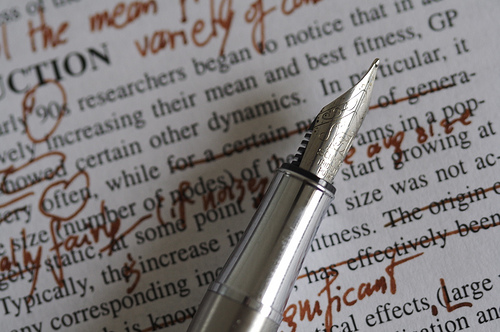 Image by Nic’s events
Image by Nic’s events
This stage often gets muddled up with rewriting. For a short piece – like a blog post or a poem – you might not need to do much rewriting or editing, and you can combine them effectively. For anything longer, though – an ebook, say, or a short story – you’ll want to edit after you’ve rewritten your piece.
Your second (or third) draft will have fixed many of the first draft’s problems. Your sections will be in the right order. You’ll have cut out anything irrelevant. You’ll have added new material where it’s needed.
But, even after rewriting, your piece isn’t finished. There’ll still be some awkward sentences and, inevitably, some typos.
Editing means going through your piece line by line and looking for things like:
- Sentences which need some work
- Paragraphs which don’t break in the right place
- Words which aren’t quite what you meant to say
- Repeated phrases or words – all writers have some favourites which they overuse
- Mistakes, like missing or mistyped words
That isn’t a comprehensive checklist, of course – but it gives you some idea of what editing involves. With some forms of writing, particular for the internet, you may also find yourself putting in formatting (bold text, subheadings, etc) during the editing stage.
For some writers, editing is the most frustrating stage. If what you really love is the fast-paced writing of draft one, or the freewheeling inspiration of planning, then editing can seem slow and tedious.
It’s important, though – and there’s a certain pleasure in getting things right. You could have written a brilliant piece but if it’s riddled with poor grammar and silly typos, readers may not make it past the first page.
Better Editing
- Edit on paper. It’s often easier to see mistakes when you’re reading on paper, rather than on the screen. Plus, on paper, you can cross out words, write annotations, etc, without making your document into a chaotic mess of red lines.
- Ask for feedback from others. Often, they’ll spot ambiguities, repetitions and typos which you’ve missed. Since you know exactly what you meant, it’s easy to miss the mistakes in your own work. If you’re working on something substantial, it might well be worth paying for help from a professional editor.
Stage #5: Publishing

Image by Rene Schwietzke
The final stage of the writing process is to publish your work. If you’re doing this yourself, I highly recommend going through proofreading as an additional stage of the editing process. It’s really frustrating to find a typo in a blog post that you’ve just emailed out to thousands of readers, or a book that you’ve just printed several copies of.
If you’re seeking traditional publication for a book, then at this step, you’ll be sending your manuscript out to agents and/or editors. For you, “publishing” your work means presenting it in the requested format, as professionally as possible.
If you’re self-publishing a book, you’ll likely want to go through some extra steps before hitting “Publish”. For instance, you might seek feedback from beta readers or a paid editor so that you can refine your work further.
As with the other stages, you can still loop back to an early stage after publishing a piece. For instance, an inital stand-alone novel might become the first in a trilogy or series … taking you all the way back to the planning stage. Or you might edit a piece that you’ve already published.
Better Publishing
1. Consider your options. It’s easy to set your heart on one type of publication (e.g. a traditional publishing deal) … but there are lots of different ways to publish your work, such as self-publishing an ebook, creating a print on demand book, or even publishing in serial format.
2. Be as professional as you can. If you’re self-publishing a book, budget for cover design (and for help with formatting unless you’re happy tackling the techy side of things). Even if you’re simply publishing a blog post, spend some time on formatting elements like images, headers, and so on.
The writing process isn’t some artificial framework you need to force yourself into. Instead, it’s a natural set of steps that help you get from “idea” to “finished, published piece”. You don’t have to tackle the stages of writing in strict sequence — you can and likely will jump back and forth between some of them. But if you get stuck, use writing process as a handy checklist to make sure you’ve covered all the essential steps.
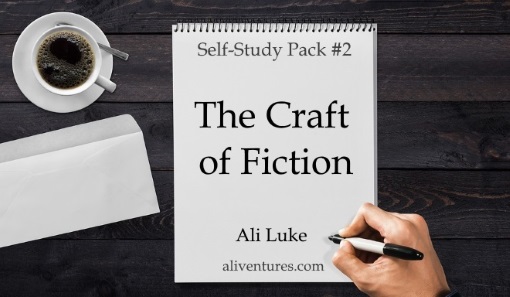
For more help, particularly with the drafting, rewriting, and editing stages, check out my self-study seminar packs. These are sets of full seminars that you can download and work through at your own pace. Each seminar comes with a full transcript plus a worksheet to make it easy to put what you’re learning into practice.
About

I’m Ali Luke, and I live in Leeds in the UK with my husband and two children.
Aliventures is where I help you master the art, craft and business of writing.
Start Here
If you're new, welcome! These posts are good ones to start with:
Can You Call Yourself a “Writer” if You’re Not Currently Writing?
The Three Stages of Editing (and Nine Handy Do-it-Yourself Tips)
My Novels

My contemporary fantasy trilogy is available from Amazon. The books follow on from one another, so read Lycopolis first.
You can buy them all from Amazon, or read them FREE in Kindle Unlimited.
36 Comments
Trackbacks/Pingbacks
- 7 Habits of Serious Writers — Aliventures - [...] reading: If you’re taking your writing seriously, you’ll want to check out The Four Essential Stages of Writing, where…
- Are You Over-Editing Your Work? — Aliventures - [...] week’s post on The Four Essential Stages of Writing got some great comments, including this one from Ainslie: I must admit…
- How to Write Thousands of Words Every Single Week — Aliventures - [...] You need to plan before you start – otherwise, it’s so easy to lose your way or your enthusiasm,…
- Extra Reading: Six of My Recent Guest Posts — Aliventures - [...] so if you’re not a blogger, I recommend digging into the Aliventures archives instead (try The Four Essential Stages…
- How to build your blog content successfully? - [...] She has helped many bloggers and writers succeed in their career. I recommend you read her article The four…
- 9 Powerful Tips for Writing Your First Successful Ebook - […] of the simplest ways to make writing easier is to have a clear outline before you begin. Otherwise, it’s…
- The Write Life Presents: The 100 Best Websites for Writers in 2014 - The Write Life - […] Post you’ll like: The Four Stages of Writing […]
- How To Become A Better Writer (By Knowing The Four Stages Of Writing) - […] are things you can do to alleviate the situation. Here’s one of the best: Study, learn, and know the stages…
- How To Become A Better Writer (By Knowing The Four Stages Of Writing) - […] things you can do to alleviate the situation. Here’s one of the best: Study, learn, and know the stages of…

Ali, FYI: the CommentLuv box says you need to update the plugin.
I did have a question about your four stages. They are critical and you explained them well, but I am wondering if they are also for blog posts. It just takes me forever to write a post (over 6 hrs each). Of course, I follow all the steps and then add the SEO… which is like a 5th step. I don’t know if I’m being too anal about blogging. It’s like publishing a short story each post. 6 hours for a short story would be considered a short time, but 6 hours for a blog post would be considered by many to be obsessive. I’d appreciate your take on this. Thanks. M.
Hmm, thanks Mary, there doesn’t seem to be an update for the plugin available so not sure what’s going on with it..!
Six hours for a blog post is definitely on the high side. The stages don’t necessarily have to take a long time (perhaps I should’ve made that clearer in the post) – I typically spend around 5-10 mins planning a blog post, then perhaps 30 – 90 mins writing (depending on its length!) and probably 5-20 minutes doing a redraft and edit. Of course, I’ve sometimes written posts which take much longer, but that’s for “typical” ones.
I’d be interested to hear about your writing process. What’s taking up a lot of time? Do you find it hard to get words down at all, or do you spend ages tweaking what you’ve written?
I always have a hard time justifying printing out my work because it kills so many trees and wastes so much ink, but I have come to realize that holding a nearly-completed work in your hands is worth it. Being able to go through with a not-red pen and marking all of the mistakes or things you want to change, justify the ink usage. It can be painful, but it makes all the difference!
Katie
If the eco side of things is a concern, you can always buy recycled paper, use both sides, print in “draft” mode…
It does indeed make a real difference, and I think it’s worth doing — even if you’re not revising your work, it’s nice to value it enough to have a printed copy!
Ali,
What helps is to have time on your side.
I have stuff published in my name, but whenever I rushed, I turned out shoddy work. When you are on a deadline, this can happen. It can also happen if you have an anxious personality that worries over end results like credits.
Writing is a funny thing and writers are funny people. Sometimes, ideas flow and sometimes you are blocked.
Even a daily writing habits does not work for all writers. Some writers, like me, swear by the lightning bulb.
It goes off and you are in the flow. Also, the step by step approach may not work for some writers, who can go from point A to point Z directly without the interim steps. But a fabulous post, Thanks for your contribution here.
Cheerio.
Great point. Time definitely helps, at all of these stages – if you rush any of them, you’re going to end up redoing work further down the line (or producing something which isn’t really up to scratch).
Hi Ali,
I must admit that I am beginning to enjoy the redrafting and editing phase of my work a whole lot more since working with you as my Writing Coach, I now spend time looking at specific words and phases and really making sure if they fit with the message I am conveying.
I am really enjoying the process but worry that the constant redrafting may be holding me back as well.
Ainslie
It’s a bit of a balancing act. I find it can help to set a time limit on redrafting/editing … otherwise you could spend forever doing it!
(I’ve got a time limit for my redraft of the Staff Blogging Course cos I’ve set a launch date. Eek…!)
i do skip important steps!! i guess i need to free some more time so that i can give each post the time it deserves
thank you Ali
Ali,
Thanks for this. I’ve found this both insightful and a good reminder. The more I think about the re-drafting and editting stages and how much work is waiting for me when my novel gets there, the more eagerly I approach my work in the drafting stage. I do sometimes lose focus and go a full week thinking and plotting, but not writing. When I read articles like yours, though, and remember the sea that separates a first draft from a presentable narrative, I focus and get to work like a respectable semi-writer should.
You also make a totally valid point about editing on paper. My tree-saving mesure has become to make an ebook from my manuscipt and read it on my kindle. I highlight the mistakes and read on. This forces me to read on, rather than getting bogged down in the technicalities of a particular passage. You are absolutely right. The potential for instant editting gratification leads to the inability to focus on both the little errors and the overall sense. I wonder why that is…. But it definitely IS.
Thanks Kseniya, glad this helped!
I use my Kindle for manuscripts, too; it’s a good way to read them more naturally and to look out for big-picture style edits. I’ve not used the highlighting function much, must give that a try!
*me on stumbleupon with my friend who draws*
Me: Oh this looks like a good writing website!
Friend: COLORFUL HIGHLIGHTERS! I HAVE TO GO DRAW AN OCTOPUS!
Ah, “distraction”, the fifth essential stage of writing … 😉 (Welcome to Aliventures, Smorez!)
Thanks for the helpful tips, Ali. You’re right, new writers including myself skip the redrafting phase. I’ve regretted that a lot lately, especially when I look back at my older posts in another blog. Hah. Thanks for the good read.
Josh Sarz’s last blog post ..The After-Reading: Every Bush Is Burning
Thanks Josh, glad you enjoyed the post. And I think however much we redraft, we’re always going to look back on our old work and feel that it’s not good enough — it’s a good thing, really, as it shows we’re always growing and moving forwards as writers.
Well that was another interesting article. I guess my weakness is the planning stage as much as the editing stage. I’m more of a “go with the flow” writer, there’s nothing like just sitting down and writing down whatever comes to mind. And I used to be pretty good at it. I tried to write a novel twice so far, but abandoned both attempts after about 200 pages. That’s of course no book, but it’s a nice page number for a try, I think. Nowadays though I find my inspiration lacking. I can’t just sit down and write ten pages anymore, I feel like I need to know it’s going somewhere and like I don’t want to waste my time with another fruitless attempt. It’s frustrating.
Not that it hasn’t been frustrating in the past, but since I discovered how much fun it is to write fanfiction and to actually get reviews, I can’t seem to find the focus to work on one of my book-ideas. But maybe I just need to find a place and a time where I can focus and try to plan my story. Like draft a storyline or write down ideas… Thanks for the post however!
Thanks Kathy, glad you found it interesting. I find it tough to plan novels, too — I tend to plan out a few chapters at a time, gradually feeling my way forwards. But I agree with you about needing to know that the story is actually going somewhere. For me, that usually means making sure I have enough plot for a novel, not just a longish short story!
I think fanfic makes a brilliant learning-ground for writers — though I hope you do manage to make time for original works too. (With a bit of luck, the people who enjoy your fanfic will be thrilled to have the chance to buy your book…!)
I’ve just known your post thanks to my new guest blogger, Hayley Huong, your post is great for those who wants to improve writing, thanks for share 🙂
Trung Nguyen’s last blog post ..How to Start a Blog: 7 Steps to Start a Blog Yourself
Thanks, Trung, glad you enjoyed it! 🙂
I am more of a listener than a reader but still love to write. My computer has the option to read it back to me out aloud and it is amazing how you can pick up spelling, punctuation, repetition and logic problems. I can edit as I go along , and it saves paper.
But best of all I can tell whether what i have written is interesting or not.
Hey-
Stumbled on this, enjoyed it tremendously. Seems that everyone is writing yet complaining about the death of literature. Felt good to read a piece from someone who understands the technicals, the shitty stuff, despite the necessity. Millions of bloggers will scratch their heads after reading this, the ones that pay attention will keep going. Thanks.
This is a great post, Ali. You’ve made a complex task as simple as possible.
If I could add anything, it’s that I’ve found that time spent in planning is almost always repaid tenfold by time saved in redrafting. Of course, people need to be able to deviate from a plan on the fly, because you’ll almost always be struck by great tangential ideas as you’re writing the first draft. Of course, people’s mileage may vary, but I couldn’t commit to writing a novel without having a very good idea of where most of the elements within are going.
Rhys’s last blog post ..Five things I learned from my favourite horror films, part 2
Rhys, great addition: I tend to do a *lot* of redrafting when I’m writing fiction, and while I’m happy with that (it seems to be how I work best), I also recognise that having a plan that I actually stuck to would definitely save me some time!
This is the most helpful article I’ve found on this topic. I love your style, your tone and especially your method. It is clear, concise and practicable. It will work well with my own style of writing and I think it is just the help I’ve been looking for to take my writing beyond first drafts. Thank you. Keep writing!
Thanks so much, Shane — I’m really glad you enjoyed this piece! 🙂
Do you draft on the computer or on paper? Which do you find more effective? I’m new here. Maybe you’ve already addressed this in detail somewhere and I just have to find it. 🙂
Welcome, Fathima! Nowadays, I draft straight onto the computer — I type faster than I hand-write (and I can type comfortably for hours whereas my hand cramps up if I write with a pen for too long). I used to draft on paper, though, and found the initial transition to drafting on the computer a bit jarring.
(Plus counting words is a heck of a lot easier on the computer!)
Sure, you can publish a blog post without doing any planning, or any rewriting and editing. Unless you’re very lucky, though (or writing something extremely short), you’ll be lacking a clear focus, the structure won’t quite work, and there’ll be clumsy sentences all over the place.
I wouldn’t call that “finished”, myself. I’d call it a draft.
I like this 💙
That’s a draft!
I always try to plan everything I write
Armiadi Asamat’s last blog post ..Trik Jitu SEO Buat Pemula
Dear Ali, what is the name of journal of this article. Please.
Hi Sudip, I’m not quite sure what you’re asking? This article is published on my blog, Aliventures — it hasn’t been published in any journals or anywhere else at all. (As far as I’m aware!)
Oh ali. i like your post. its very good and maked me feeling better to writted
Hi Ali … lost my comment for third time. Should make on wordperfect first and then copy … I am out of touch and sorry it didn’t come out … please tell everyone to write every day … I’m not since my open heart surgery and suffice to say it’s a mistake. Hope you and your family are doing really well!
God Bless!
Richard Carter’s last blog post ..Merry Christmas to All of You this Year of Our Lord 2017
Sorry the blog ate your comment, Rick! Thanks for your good wishes.
Great tips, Ali. I often struggle to stay focus on my writing. These tips will definitely help me write better content for my website.
This is the most helpful article I’ve found on this topic. I love your style, your tone and especially your method. It is clear, concise and practicable. It will work well with my own style of writing and I think it is just the help I’ve been looking for to take my writing beyond first drafts. Thank you. Keep writing!
I’m so glad this was helpful, Lisa! Best of luck with your writing (and rewriting & editing). 🙂